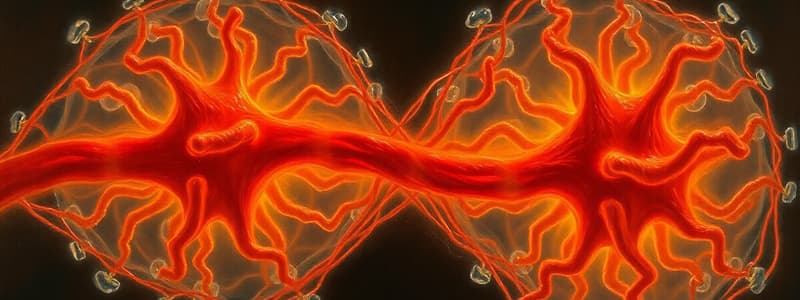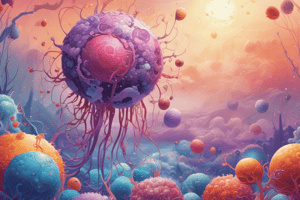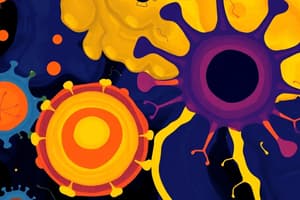Podcast
Questions and Answers
Which chromosome is the alpha TCR chain located on?
Which chromosome is the alpha TCR chain located on?
- Chromosome 18
- Chromosome 14 (correct)
- Chromosome 5
- Chromosome 7
What is the role of the pre-TCR complex during T-cell development?
What is the role of the pre-TCR complex during T-cell development?
- Signals productive rearrangement of TCR beta (correct)
- Initiates the formation of TCR alpha-chain
- Facilitates positive selection in the thymus
- Promotes T-cell activation
What is required for T-cell activation?
What is required for T-cell activation?
- Presence of both TCR and CD3 complexes
- Two distinct signaling pathways
- Only binding of pMHC:TCR
- Binding of pMHC:TCR with CD4 and a co-stimulatory signal (correct)
What occurs during positive selection in T-cell development?
What occurs during positive selection in T-cell development?
Which of the following cells expresses CD3?
Which of the following cells expresses CD3?
What is the primary location for T-cell progenitor development?
What is the primary location for T-cell progenitor development?
What differentiates alpha:beta T-cells from gamma:delta T-cells?
What differentiates alpha:beta T-cells from gamma:delta T-cells?
What is ZAP70's role in T-cell signaling?
What is ZAP70's role in T-cell signaling?
Flashcards are hidden until you start studying
Study Notes
T Cell Receptor (TCR)
- The alpha TCR gene is located on chromosome 14.
- The beta TCR gene is located on chromosome 7.
- The delta TCR gene is located on chromosome 14.
- The gamma TCR gene is located on chromosome 7.
T Cell Development
- There are two distinct lineages of T cells based on their expression of TCR chains.
- Alpha:beta T-cell receptors
- Gamma:delta T-cell receptors
- Both alpha:beta and gamma:delta T cells are lost in a deficiency of the signaling receptor Notch1.
- T cell progenitors develop within the thymus.
- T cell progenitors originate in the bone marrow.
T Cell Activation
- T-cells recognize antigens presented by MHC molecules.
- The binding of pMHC:TCR and CD4, followed by the co-stimulatory binding of CD28:CD8-/86 (B7), produces T cell activation.
- T-cells require two signals for activation.
- TCR with p:MHC
- Co-stimulatory signal with B7 (CD80/86) with CD28
Pre-TCR Complex
- The pre-TCR complex consists of the beta-chain of TCR and CD3 molecules.
- The pre-TCR complex functions in:
- Signaling productive rearrangement of TCR beta for further proliferation
- Suppressing further rearrangement of the beta-chain
- Preparing cells for rearrangement of the alpha-chain
T Cell Selection
- Positive selection commits T-cells to either CD4 or CD8 single-positive T-cells.
Professional Antigen-Presenting Cells (APCs)
- The three phagocytes are: macrophages, neutrophils, and dendritic cells.
- The three professional APCs are: dendritic cells, macrophages, and B-cells.
Thymus
- Immature thymocytes travel from the cortex to the medulla during development.
- The thymus contains a network of epithelial cells for structure.
- The thymus is associated with positive and negative selection.
- The thymus is the site of T-cell development.
T Cell Differentiation
- T-cells commit to the single-positive cell type of either CD4+ or CD8+ during positive selection.
- All T-cells express CD3.
Other Immune Cells
- NK cells have KIRs and KARs.
- NKT cells only have TCRs.
T Cell Signaling
- ZAP70 is the tyrosine kinase that transmits the signal onward along the T-cell signaling pathway when activated.
- ZAP70 transmits the signal for T-cell development and activation.
TCR Rearrangement
- Successive rearrangements can rescue an initial nonproductive beta-chain rearrangement.
- Rescue is possible only if that rearrangement involves D and J segments associated with the C-beta-2 gene segment.
Studying That Suits You
Use AI to generate personalized quizzes and flashcards to suit your learning preferences.




